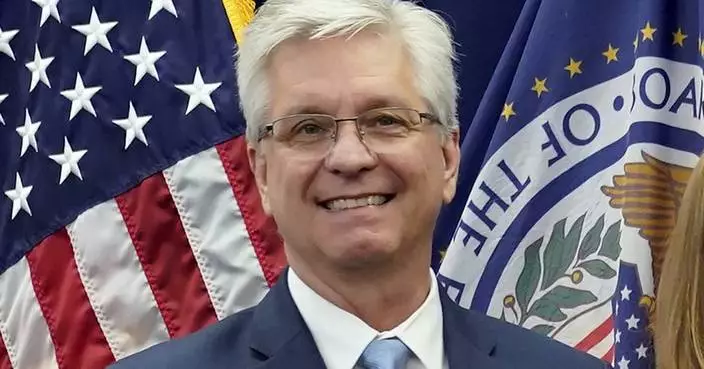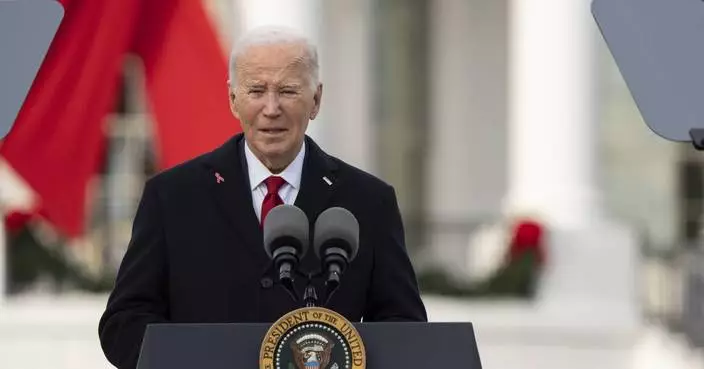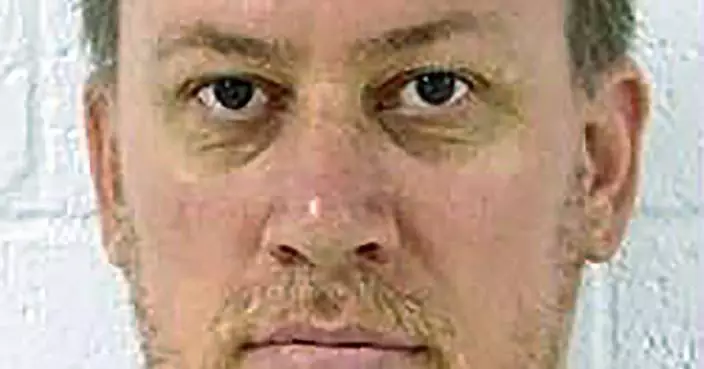LONDON (AP) — Chris Hoy, who won six gold medals while competing for Great Britain at four Olympic Games, has revealed that he is suffering from terminal prostate cancer.
Hoy, 48, made the announcement in an interview with Britain’s Sunday Times newspaper that precedes the publication of his memoir next month. The retired track cyclist had previously said he was undergoing cancer treatment without discussing details of his diagnosis.
Hoy’s cancer was detected in September 2023 when he sought treatment for what he thought was a strained shoulder, the Sunday Times reported. Scans revealed he had prostate cancer that had spread to his shoulder, hip, pelvis, spine and ribs.
Doctors told Hoy that his cancer was incurable and would likely take his life within two to four years, the newspaper reported.
“And just like that, I learn how I will die,” Hoy writes in his memoir, titled “All That Matters: My Toughest Race Yet.”
Hoy is one of Britain’s most celebrated athletes after winning 11 world championship gold medals and six Olympic golds in a cycling career that spanned more than a decade.
Hoy’s Olympic career began at the 2000 Games in Sydney, where he won a silver in the team sprint. He went on to win gold in the 1,000-meter time trial at Athens in 2004, gold in the team sprint, sprint and keirin at Beijing 2008 and two more golds in the team sprint and keirin in front of a home crowd at the 2012 Olympics in London.
AP sports: https://apnews.com/hub/sports

FILE - This is an Aug. 7, 2012 file photo of Britain's Chris Hoy as he shows his gold medal in the track cycling men's keirin event, during the 2012 Summer Olympics in London. (AP Photo/Christophe Ena, File)

FILE - Former Olympian Chris Hoy waves as he is introduced on Centre Court ahead of the third round match between Cameron Norrie of Britain and Alexander Zverev of Germany at the Wimbledon tennis championships in London, on July 6, 2024. (AP Photo/Kirsty Wigglesworth)
NEW YORK (AP) — A defense lawyer asked jurors to put themselves in frightened subway riders' shoes Monday at the trial of a Marine veteran charged with choking an irate, homeless man to death after an outburst on a New York underground train.
Prosecutors countered that Daniel Penny was way too forceful and reckless in responding to Jordan Neely.
Both sides gave closing arguments Monday at Penny's trial on manslaughter and criminally negligent homicide charges. Penny, who gripped Neely’s neck for about six minutes, claims he was defending fellow passengers. He has pleaded not guilty.
Prosecutors say Penny was justified in using some physical force after Neely shouted in a crowded train about being willing to die, willing to go jail or — as Penny and some other passengers recalled — willing to kill. But prosecutors argue that Penny recklessly went way too far in dealing with an unarmed man.
"You obviously cannot kill someone because they are crazy and ranting and looking menacing, no matter what it is that they are saying,” Manhattan Assistant District Attorney Dafna Yoran told jurors Monday.
Defense attorney Steven Raiser asked jurors to imagine they were on that train when Neely got on, “filled with rage and not afraid of any consequences.”
“You’re sitting much as you are now, in this tightly confined space. You have very little room to move and none to run," Raiser told jurors, saying his client “put his life on the line” for strangers.
“Who would you want on the next train with you?” he asked.
Penny's reaction to Neely touched raw nerves and fueled debate about race relations, public safety, urban life and different approaches to crime, homelessness and mental illness.
Some in New York and around the country see Penny, a 26-year-old Marine veteran turned architecture student, as a valiant protector of fellow subway riders who feared the erratic Neely was on the verge of violence. Others view Penny as a white vigilante who summarily killed a Black man who was in need of help.
The case sparked demonstrations that lambasted Penny and rallies that lauded him. In the defense argument Monday, Raiser sought to undercut some prosecution witnesses' credibility by saying they were testifying “in the shadow of protesters” who gathered outside the courthouse to demand justice for Neely.
Neely, 30, once was among the city's corps of subway and street performers and was known for his Michael Jackson impersonations. But after his mother was violently killed when he was a teenager, Neely was diagnosed with depression and schizophrenia, was repeatedly hospitalized, struggled with drug abuse and had a criminal record that included assault convictions.
During the monthlong trial, the anonymous jury heard testimony from subway passengers who witnessed Penny's roughly six-minute restraint of Neely, as well as police who responded to it, pathologists, a psychiatric expert, a Marine Corps instructor who taught Penny chokehold techniques and Penny's relatives, friends and fellow Marines. Penny chose not to testify.
Jurors watched videos recorded by bystanders and by police body cameras and saw how Penny explained his actions to officers on the scene and later in a stationhouse interview room.
“I just wanted to keep him from getting to people,” he told detectives, demonstrating the chokehold and describing Neely as “a crackhead” who was “acting like a lunatic.”
“I'm not trying to kill the guy,” he insisted.
Multiple witnesses said Neely shouted about needing food and something to drink, whipped his jacket to the floor and started screaming. They differed in descriptions of his movements and whether they were threatening. Several passengers said they were alarmed, and some were thankful when Penny subdued Neely.
City medical examiners ruled the chokehold killed Neely. A pathologist hired by Penny’s defense contradicted that finding, saying Neely was killed by a variety of other factors.
Prosecutors noted that the veteran continued to grip Neely's neck after the train stopped and anyone who wanted to get out could do so, after bystanders urged Penny to let go, and even after Neely had been still for nearly a minute.
“You, the jurors, should unequivocally state with your verdict that no person’s life can be so unjustifiably snuffed out," Yoran said Monday.
The defense says Penny held on because Neely tried to break loose at points and the pressure on the man's neck wasn't consistent enough to kill him.
Penny wanted only to hold Neely for police, and so used a “simple civilian restraint” instead of a “textbook chokehold” that would be applied to render someone unconscious, Raiser told jurors.
“The police weren’t there when the people on that train needed help. Danny was,” the attorney said.

Daniel Penny arrives at the court after break in New York, Monday, Nov. 18, 2024. (AP Photo/Yuki Iwamura)

Daniel Penny leaves the courtroom for a lunch break in New York, Monday, Nov. 18, 2024. (AP Photo/Yuki Iwamura)













